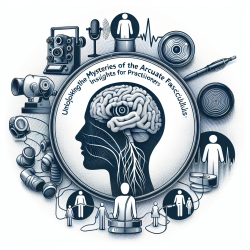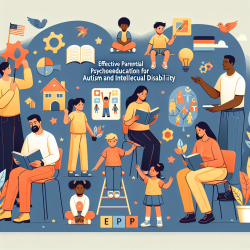Understanding the Arcuate Fasciculus in Schizophrenia: Implications for Practitioners
As a practitioner in the field of speech-language pathology, understanding the neural underpinnings of disorders can significantly enhance therapeutic strategies. Recent research has shed light on the arcuate fasciculus, a critical white matter tract, and its role in auditory verbal hallucinations (AVH) in schizophrenia. This blog explores these findings and their implications for practice.
The Study at a Glance
The study titled "Integrity of the arcuate fasciculus in patients with schizophrenia with auditory verbal hallucinations: A DTI-tractography study" investigates the relationship between AVH severity and the integrity of the arcuate fasciculus using diffusion tensor imaging (DTI) tractography. The research included 38 patients with treatment-resistant schizophrenia, divided into those with severe AVH and those with prominent negative symptoms but no AVH.
Key Findings
- Fractional anisotropy (FA) values were significantly higher in the left arcuate fasciculus in patients with AVH compared to those without.
- A positive correlation was found between FA values in the left arcuate fasciculus and AVH severity, suggesting a specific relationship.
- No significant differences were observed in the right arcuate fasciculus, highlighting the left hemisphere's role in speech and language processing.
Implications for Practice
These findings emphasize the importance of the left arcuate fasciculus in the manifestation of AVH in schizophrenia. For practitioners, this suggests a potential target for therapeutic interventions. Here are some ways to integrate these insights into practice:
- Targeted Interventions: Develop therapies that focus on enhancing left hemisphere connectivity and function, potentially reducing AVH severity.
- Personalized Therapy Plans: Use imaging data to tailor interventions based on individual neural profiles, enhancing treatment efficacy.
- Collaboration with Neuroscientists: Engage in interdisciplinary research to further explore the neural mechanisms underlying speech and language disorders.
Encouraging Further Research
While this study provides valuable insights, the complexity of schizophrenia and its symptoms necessitates further research. Practitioners are encouraged to collaborate with researchers to explore additional factors influencing AVH and other symptoms. Such collaboration can lead to more comprehensive treatment approaches and improved patient outcomes.
To read the original research paper, please follow this link: Integrity of the arcuate fasciculus in patients with schizophrenia with auditory verbal hallucinations: A DTI-tractography study.










